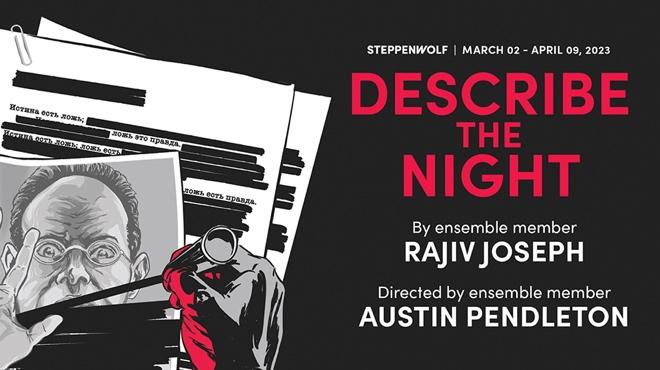
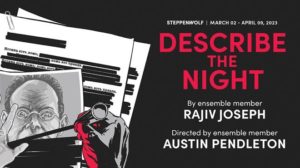 [rating=3]“Describe the Night”, written by Rajiv Joseph and directed by Austin Pendleton, is convoluted in the best of all possible ways. The story revolves around the KGB and the bureaucracy of the former Soviet Union, as well as the Stasi (or state security service of East Germany) and other spy agencies throughout Eastern Europe. We witness how these agencies and the people who run them define the truth and perpetuate lies. We see how Soviet disinformation works its way from the level of Party officials and bureaucrats down to the level of each individual citizen. In a society where it is dangerous to run afoul of what the government wants the population to think and believe, individuals are forced to conform out of fear for themselves and their loved ones. The upshot is that they can never lead authentic lives, and life is more miserable for them than need be.
[rating=3]“Describe the Night”, written by Rajiv Joseph and directed by Austin Pendleton, is convoluted in the best of all possible ways. The story revolves around the KGB and the bureaucracy of the former Soviet Union, as well as the Stasi (or state security service of East Germany) and other spy agencies throughout Eastern Europe. We witness how these agencies and the people who run them define the truth and perpetuate lies. We see how Soviet disinformation works its way from the level of Party officials and bureaucrats down to the level of each individual citizen. In a society where it is dangerous to run afoul of what the government wants the population to think and believe, individuals are forced to conform out of fear for themselves and their loved ones. The upshot is that they can never lead authentic lives, and life is more miserable for them than need be.
The use of propaganda and obfuscation creates the inability to trust others, which is personified in the encounter between the two main characters of the play. James Vincent Meredith becomes the Soviet author Isaac Babel, a Jewish reporter and writer, originally from Odesa. The question is whether he is present on a fateful night outside of the city of Zhitomir in 1920 to find out more about an axe murder or whether he simply wants to put down his descriptions of the moon and Venus onto paper. It is that night when he makes the acquaintance of a Russian soldier named Nikolai Yezhov (Yasen Peyankov), a soon-to-be KGB agent. Both men are sharp and know that government informants are spying on honest citizens, so they have to feel each other out regarding how much each of them knows about the state of things as they really are. Initially Babel and Nikolai do a dance, trying to glean the truth behind the other while, at the same time, spouting words of caution. In fact, they become very close friends and throughout the performance, we see them sharing confidences about the nature of spying and who is doing the listening. The key is how making up lies becomes essential to preserve oneself in this irrational environment. And then there’s the warning to “never confess”—but confess to what? I especially loved watching the fine talent of Peyankov as Nikolai. His presence makes the show, and if there is any one reason to see this production, it is to watch him perform on stage! Other cast members include: Jack Cain, Glenn Davis, Charence Higgins, Jon Hudson, Sally Murphy, and Caroline Neff.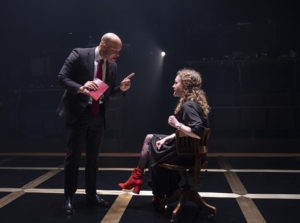
This is one of those plays that you either love or hate, largely because of its jumpy timeline. The story is meant to be a mystery that is focused on this one small red book—Babel’s diary—and what it must reveal. Babel, it seems, is leery of the Soviet authorities, so he can only feel comfortable writing down words that seem innocuous. But do these words contain a hidden meaning, ultimately known only to those who are clued in? To obtain the answer to this question, the audience is taken on a ride through time and space, starting with the year 1920 but then springing forward to 2010, then falling back to 1937, 1940, 1989, and lastly 2010 or sometime shortly thereafter. We travel within the Soviet Union, Poland, and East Germany. The diary has definitely made its rounds, and it is fascinating to see who possesses it and why. But there are additional mysteries which we only learn about by watching the adventure unfold. Despite the seemingly unfocused timeline, the scenes eventually build and the meaning behind each becomes more understandable. I enjoyed when one part of my brain kept trying to make sense of all the intrigue and false narratives. But about 45 minutes into the performance, I decided that a lot of this story wasn’t supposed to make sense, so I sat back and decided it was best to just “go with the flow.” That said, about 30 minutes before the end, the various threads in the plot started to come together, although the ending wrapped things up in a bow much too tightly for my taste.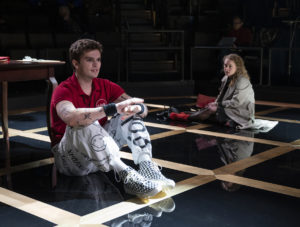
That said, what I liked best about the script is that it keeps you on your toes. Many spots are funny, especially when it comes to intrigue and discerning the difference between lies and the truth. I liked the way all the characters rationalized their idiosyncratic behavior… until their lies didn’t work anymore. We learn that Nikolai doesn’t really care for his wife and that Babel’s wife is in Paris as he works in the Soviet Union. The two men may or may not have some romantic attraction to each other—although in that time period, this could not have been expressed as openly as today. But the various dalliances among the different characters and their unusual consequences made me wonder: To what extent is this script playing fast and loose with the truth? How much of this tale is meant to be a fantasy? Of course, the sequences incorporating smatterings of Babel’s short stories is supposed to be farfetched. I particularly enjoyed the vignette about the soup (karechi): a seeming throwback to the time period of the czar. Other stories about farm animals like goats, ducks, and chickens seemed to appeal to other members of the audience more than they did to me. I also learned something about Babel’s biography: that his writings were banned and he was intentionally deleted from the public record during Stalin’s time. We see the death of his stories, but we never see his physical death. But that isn’t necessary! The man has been erased; he has become a nonperson.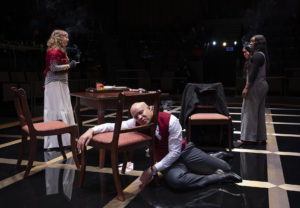
However, when the evening was finally over, I decided that the play’s three-hour runtime with one 15-minute intermission was much too long and drawn out. Too many elements of the script are repetitive, if not plain weird. Plus the pacing is off. By the time the audience sees where things are going, it might be too late. Not everybody returned after intermission; although at the end, several audience members gave the players a standing ovation.
The makeup and costuming are superior, thanks to Raquel Adorno’s costume design and Silver Fox Wigs. What is especially great is Collette Pollard’s “empty” set design except for an array of huge glamorous tiles on the floor and two chandeliers hanging from the ceiling. What is spectacular is seeing the elevator and furnace that come up from the floor! Props, consisting mostly of furniture, are minimal but appropriate to tell the story, and, of course, there are the soup plates and the soup! Keith Parham’s lighting design and Pornchanok Kanchanabanca’s sound design are exactly what they should be.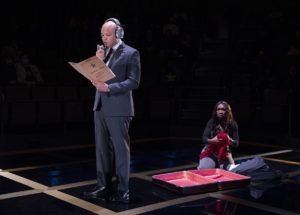
While this play is based on real people, the question of the day is whether this story is actually true, and if so, to what extent? How do we distinguish truths versus lies versus cleverly written narratives? How can we discern what the playwright wants us to think or believe versus the real biographies of his characters? And why should this matter to us? In today’s era when the discussion has turned to “fake news” and “alternative facts”, this show could be seen as a warning: that it is dangerous to live in a society where the facts play second fiddle to how they can be spun or altered. The phrase “describe the night” doesn’t necessarily mean differentiating between gloom and doom but facing that part of ourselves that refuses to hide in the moonlight.
“Describe the Night” is playing through April 9, 2023, at the Steppenwolf Theatre’s Ensemble Theatre, 1646 N. Halsted Street, Chicago.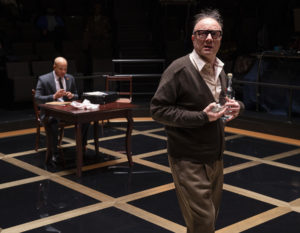
Single tickets are $20-$86
Performance schedule:
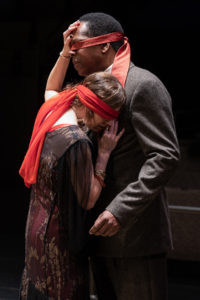 Tuesdays, Thursdays, and Fridays – 7:30 p.m.
Tuesdays, Thursdays, and Fridays – 7:30 p.m.
Wednesday, March 15, March 22,and April 5 – 7:30 p.m.
Wednesday, March 29 – 2:00 p.m.
Saturdays – 2:30 p.m. and 7:30 p.m.
Sundays – 2:30 p.m.
Accessible performance dates:
Open-captioned – Thursday, March 23 at 7:30 p.m. and Saturday, April 8 at 2:30 p.m.
ASL-interpreted* – Friday, March 24 at 7:30 p.m.
Audio-described and touch tour – Sunday, April 2 at 2:30 p.m. (1:00 p.m. touch tour, 2:30 p.m. curtain)
Mask-required performances – Wednesday, March 15 at 7:30 p.m., Wednesday, March 29th at 2:00 p.m. and Saturday, April 1 at 2:30 p.m.
To purchase tickets, go to https://cart.steppenwolf.org/overview/17766. or call the box office at 312-335-1650.
For more information about this show, see https://www.steppenwolf.org/tickets–events/seasons-/2022-23/describe-the-night/.
For general information about the Steppenwolf Theatre and to learn about their other offerings, visit https://www.steppenwolf.org/.
Self-parking is available in the Steppenwolf parking garage located at 1624 N. Halsted St. (cash and credit accepted). Please note that the garage does not have an elevator. Valet parking service is available in front of our main at 1650 N. Halsted St.
Steppenwolf Theatre Company continues to follow the community masking guidelines recommended by the Chicago Department of Public Health. Currently masks are optional (except for mask-required performances noted above), but circumstances may change at any time.
*The night I saw the performance (March 15th) happened to be the rehearsal for the ASL (American Sign Language) performance of March 24th. On entering the building, I happened to run into Patti Shore Kaden, one of the ASL interpreters, and we got into a conversation about who gets to do the interpretation and why. We discussed how theatrical interpreting is a subspecialty which requires a singular expertise. While there are medical interpreters and legal interpreters, theatrical interpreters are relatively few. A male and female interpreter are generally paired up, so that the man signs for the male characters and the woman signs for the female characters—often but not always. Kaden explained how during COVID, she wore a “not too bad” mask with clear plastic over the mouth area, so that a deaf person could still read lips. It wasn’t clear whether or not she’ll be wearing this mask during the March 24th performance, since that evening the audience will be largely unmasked, unless revised COVID protocols dictate otherwise.
To see what others are saying, visit www.theatreinchicago.com, go to Review Round-Up and click at “Describe the Night”.






More Stories
“The Firebugs” reviewed by Julia W. Rath
“The Book of Grace” Al Bresloff with another from Paul LIsnek
“The Last Five Years” MILWAUKEE